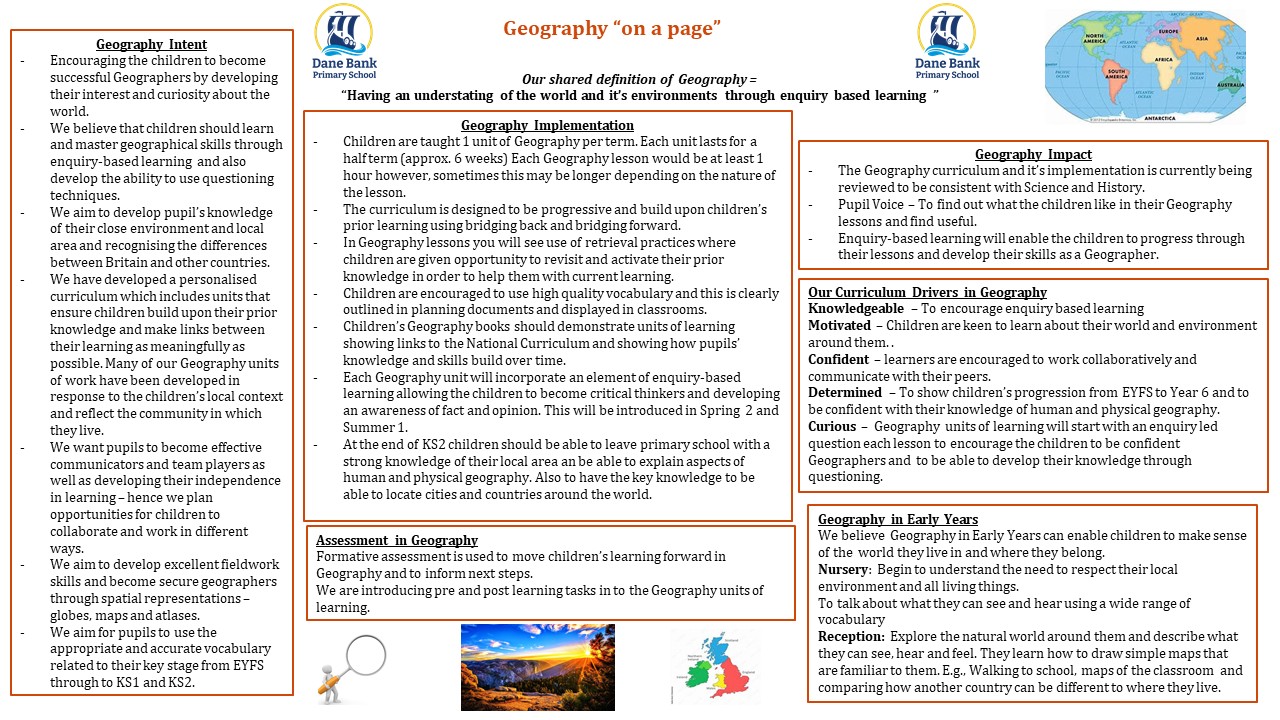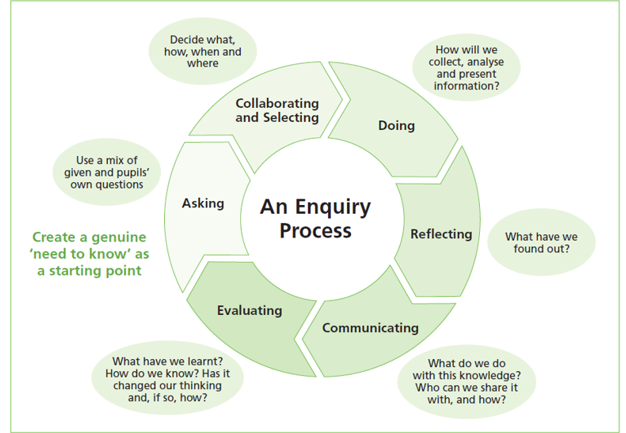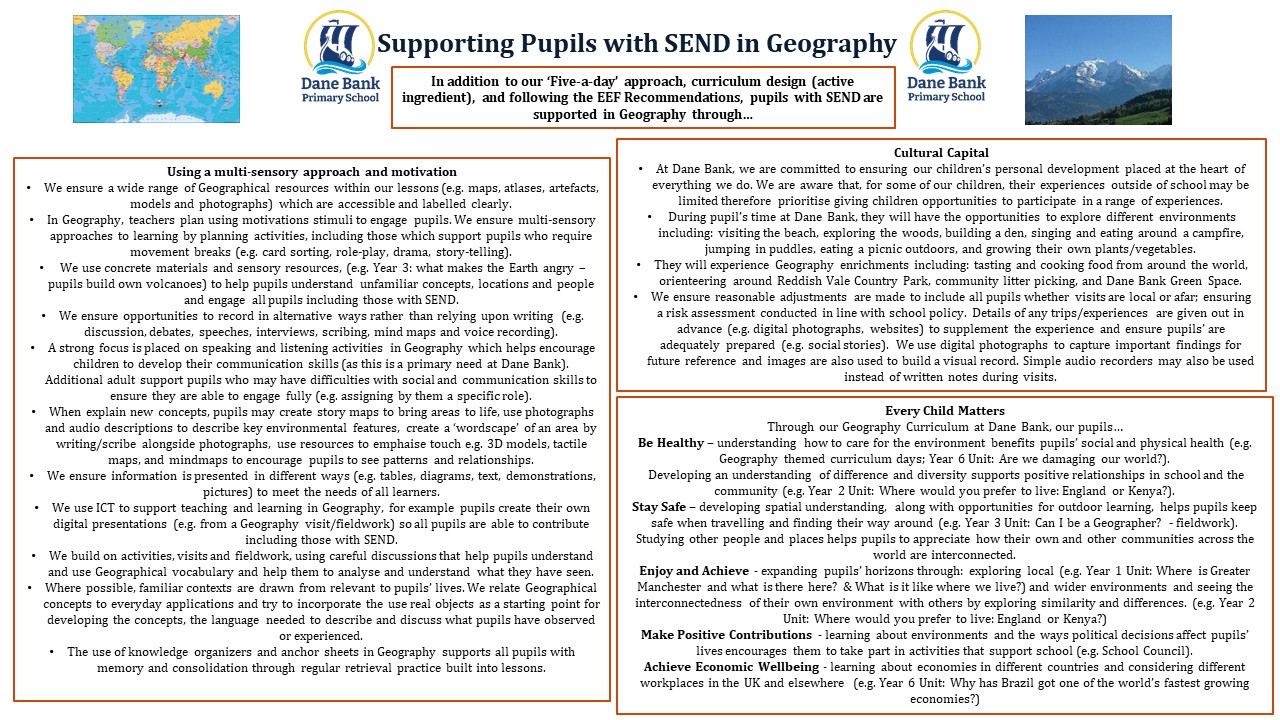Geography
Geography is one of our ‘lead’ curriculum subjects (along with History). Each term, children are taught a Geography unit which lasts approximately 6 weeks. Cross-curricular links are made and when appropriate, for example – through opportunities for writing, Art and Design and Technology. The units are always based around a Learning Challenge Question. The overarching question is then broken down in to a series of supplementary questions which lead investigation in each lesson. Throughout each unit, there is emphasis placed on enquiry. Using the questions as a stimulus, children are actively encouraged to investigate, research and find things out for themselves.
Children are introduced to a selection of vocabulary which forms one of the key areas of learning during the units. A strong focus is placed on speaking and listening activities in order to encourage children to develop their use of these subject-specific terms.
The Geography curriculum has been planned carefully based on key knowledge that children will learn during each unit. The curriculum map allows for progression as the units build on prior knowledge and aim to extend learning by acknowledging what children already know. Careful consideration is given to the school’s context and local area and the curriculum has been designed to link to this as far as possible. For example, Geography units link in to work around the local area as much as possible and also link to environmental issues within our locality, for example – a unit based around the local initiative to reduce congestion/traffic issues and build a bypass near a busy motorway. This should give children a sense of purpose with their learning and make the Geography curriculum relevant and relatable.
Geography "Subject on a Page"

Geography Long Term Plan & Disciplinary Knowledge Progression
Key geographical concepts are mapped through our curriculum progression documents. These concepts include:
| Place | Space | Scale |
| Interdependence | Physical and human processes | Environmental impact |
| Sustainable development | Cultural awareness | Cultural diversity |
geography disciplinary knowledge and procedural knowledge dane bank.pdf
Geography Knowledge Overviews
Our Geography Knowledge Overviews outline the key substantive knowledge planned within each unit:
- Year-1-Geography
- Year-2-Geography
- Year-3-Geography
- Year-4-Geography
- Year-5-Geography
- Year-6-Geography
Geographical Enquiry
We are currently working hard to develop our Geography curriculum further and ensure there is a signficant element of Geographical Enquiry woven through each subject. This is in line with the work we are doing in History also. Geographical Enquiry encourages children to develop their thinking skills as well as collaboratively and talking with their peers. A good enquiry question has both ‘pith and rigour’. It is engaging, so that pupils want to answer it,
yet it must give the opportunity for careful and challenging development of pupils’ geographical learning. Good enquiry questions set up issues which can be unpacked – they should lead to debate and discussion. We have used materials from the Geographical Association to support us in this work.

|
The units outlined below are full fieldwork enquiry units. During these units of learning, the full enquiry process, as shown on the diagram above, will be followed: |
|||||
|
Year 1 |
Year 2 |
Year 3 |
Year 4 |
Year 5 |
Year 6 |
|
Full fieldwork enquiry process unit: Autumn 1 (What is it like where we live?) |
Full fieldwork enquiry process unit: Autumn 2 (What are the seasons?)
|
Full fieldwork enquiry process unit: Spring 2 (Can I be a geographer?)
|
Full fieldwork enquiry process unit: Summer 1 (Why are most of the world’s cities located near rivers?) |
Full fieldwork enquiry process unit: Summer 1 (Where does all our stuff come from?)
|
Full fieldwork enquiry process unit: Summer 2 (How marvellous are maps?)
|
Geography in the Early Years
In the Early Years, pupils are provided with opportunities to develop a range of highly transferable skills values and attributes, including: problem-solving, observation, collaboration, open-mindedness, courage, resilience, curiosity, integrity, and a sense of what is fair and equitable. These combine to allow them to explore, interpret and ‘experience’ the world around them, as well as providing the foundations on which all future learning can be built. Of the seven areas of learning and development outlined in the EYFS framework the one that links most closely to our Geography curriculum in school is, ‘Understanding the World’. Children are guided to make sense of their physical world and community through a range of personal experiences.
When planning our curriculum we recognised the work of Simon Catling “Leading Primary Geography” and aim to plan in the 7 ‘big ideas’ to support children in developing geographical learning:
Place: What is it like, what happens there, how it changes, emotion response.
Space: Location, distribution, patterns and network connections, layout.
Scale: Local, regional, national, continental, global.
Environment: Physical and human processes, actions and features, change.
Environmental impact: Interactions, disparity, connections, social identity, values.
Cultural awareness: Diversity, disparity, connections, social identity, values.
Interconnections: Links between features, places, events and people.
To see how Geography is woven through our Early Years curriculum, please click here for Nursery and click here for Reception.
Our Early Years to Key Stage One "Bridging Documents" give an overview of how the Geography curriculum "bridges" from the end of Nursery and Reception in to Year One.
bridging from early years in to year one geography.pdf
Inclusion in Geography

Oracy in Geography
oracy in geography curriculum.pdf
Geography - Curriculum Impact

